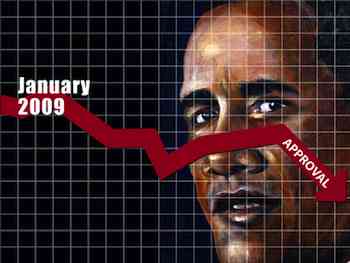- MENU
- HOME
- SEARCH
- WORLD
- MAIN
- AFRICA
- ASIA
- BALKANS
- EUROPE
- LATIN AMERICA
- MIDDLE EAST
- United Kingdom
- United States
- Argentina
- Australia
- Austria
- Benelux
- Brazil
- Canada
- China
- France
- Germany
- Greece
- Hungary
- India
- Indonesia
- Ireland
- Israel
- Italy
- Japan
- Korea
- Mexico
- New Zealand
- Pakistan
- Philippines
- Poland
- Russia
- South Africa
- Spain
- Taiwan
- Turkey
- USA
- BUSINESS
- WEALTH
- STOCKS
- TECH
- HEALTH
- LIFESTYLE
- ENTERTAINMENT
- SPORTS
- RSS
- iHaveNet.com: Politics
by Kenneth T. Walsh

Obama's Approval Ratings (© Jennifer Kohnke)
President Obama is a cool customer. He doesn't seem to get really angry, depressed, or frustrated or to lose control of his emotions.
And that's the problem. To some of his supporters, Obama is presiding over a passionless presidency. He seems too cerebral and personally disengaged from the problems of everyday Americans. Some have compared him to Mr. Spock, the brainy and aloof Vulcan of the Star Trek movie and TV series who tried to base his decisions totally on reason and logic.
In a recent interview, Obama told me that his goal is to "make
decisions based on information and not emotions." Actor Leonard
Nimoy, who played Spock on Star Trek, even weighed in. "I guess
it's somewhat unusual for a politician to be so precise, logical, in his
thought process. The comparison to Spock is, in my opinion, a compliment
to him and to the character." And
When emotions well up, Obama prefers to be alone with
his thoughts. Aides say that was his pattern on an October
29 predawn visit to Dover Air Force Base in
Delaware to mark the return of 18 flag-draped
caskets containing soldiers and
"He takes these things as they come," says a senior
Other presidents have shown emotion on occasion. It wasn't unusual for Harry Truman to get angry when someone criticized his family. He famously threatened to punch a newspaper critic for mocking the musical abilities of his daughter, Margaret, a professional singer.
Lyndon Johnson had a volcanic temper, and he let it show when something went wrong. Richard Nixon was very controlled in public, but in private he would fume and curse his adversaries. He even had his aides compile an "enemies list." Bill Clinton had a flash-and-fade temper, which would erupt suddenly and then disappear. But he also was known for empathizing with people who were down on their luck.
George W. Bush seemed to get more emotional as time went on, despite his initial image as a swaggering cowboy. In April 2008, Bush wept openly when he posthumously awarded Navy SEAL Michael Monsoor the Medal of Honor for courage in Iraq.
As for President Obama, some of his friends and advisers admit that perhaps he does need to show his personal side more often. This is key as he tries to generate support for the surge of 30,000 additional troops into Afghanistan. "He is asking soldiers to fight and maybe to die," says a Democratic strategist. "It's important for him to show he believes deeply in the mission."
Obama recently told 60 Minutes that he considered his December 1 speech at West Point announcing the surge "probably the most emotional speech that I've made." Yet his feelings were not very much in evidence. He came across as almost totally analytical.
The problem comes not when a president shows emotion but when he goes overboard. Americans want to know that their leader shares their emotions at times of tragedy, sorrow, or outrage. And that emotional side is something that Obama has yet to fully communicate.
AMERICAN POLITICS
WORLD | AFRICA | ASIA | EUROPE | LATIN AMERICA | MIDDLE EAST | UNITED STATES | ECONOMICS | EDUCATION | ENVIRONMENT | FOREIGN POLICY | POLITICS
Receive our political analysis by email by subscribing here
Critics Say Obama Lacks Emotion | Kenneth T. Walsh
© Tribune Media Services